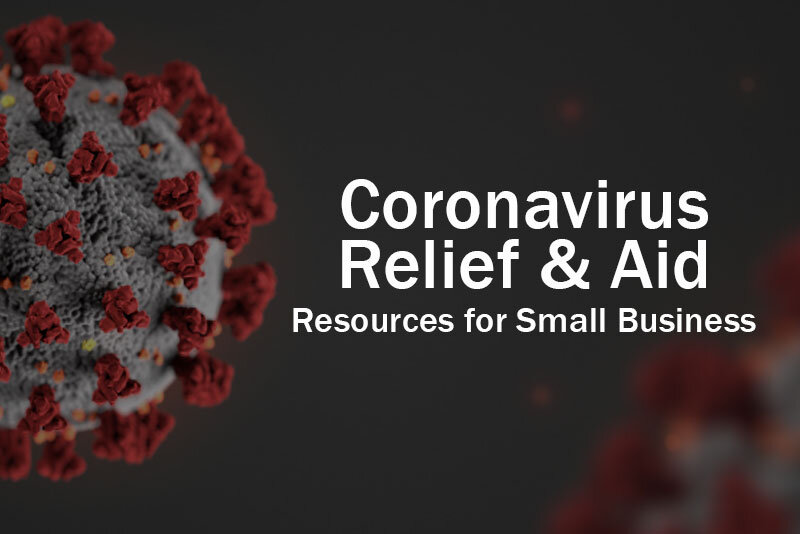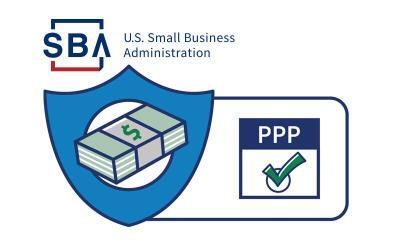During this uncertain time, I know many small business owners and entrepreneurs are feeling overwhelmed and stressed by the unknown. Not only do entrepreneurs worry about how the COVID-19 situation will hurt their businesses, but they also feel concerned about their employees. Indeed, the coronavirus has turned our world upside down.
Fortunately, federal, state, and local governments are stepping up to the plate to create ways to provide Coronavirus relief and aid to businesses and the people who work for them.
In this article, I will share some of the currently available information about various Coronavirus relief, aid, resources, programs, and initiatives in place to help small business owners.
Realize that this is a dynamic topic, and details are constantly changing as agencies and lawmakers continue discussions and decision-making. We will do our best to keep this article up to date with accurate and timely information. However, please refer to the list of resources at the end of this post for the most current information about available developments. Also, consult your attorney and tax advisor for advice and guidance as you assess the assistance you qualify for and navigate the application process.
CDC Guidance for Business Owners
The Centers for Disease Control have created an online interim guide that updates employers on how to plan, prepare, and respond during the COVID-19 outbreak. Within it, they offer recommendations for dealing with sick employees, cleaning the work environment, and creating a response plan. As this crisis will affect virtually every business in the United States, the CDC’s guide is a helpful resource for working through many of the disease-related considerations we all need to address.
Coronavirus Federal Income Tax Relief
The IRS has made changes to tax filing deadlines to help individuals and businesses affected by the impacts of COVID-19.
On March 18, 2020, the U.S. Treasury Department and IRS “issued guidance allowing all individual and other non-corporate tax filers to defer up to $1 million of federal income tax (including self-employment tax) payments due on April 15, 2020, until July 15, 2020, without penalties or interest.” Corporate taxpayers are subject to a similar deferment of up to $10 million of federal income tax payments that would be due on April 15, 2020. They may defer payment until July 15, 2020, without suffering any penalties or interest.
As of an announcement on March 20, the federal income tax payment and filing deadline is extended from April 15, 2020 to July 15, 2020.
The IRS is automatically providing this relief to taxpayers; individuals and businesses do not need to file any additional forms or contact the IRS for the relief. Any unpaid balances as of July 16, 2020, will begin to accrue penalties and interest will begin to accrue on any remaining unpaid balances as of July 16, 2020.
Additional Details about the Federal Income Tax Relief
Individuals:
- Income tax filing and payment deadlines for individual returns, with a due date of April 15, 2020, are automatically extended until July 15, 2020.
- The payment relief applies to all individual tax returns (including self-employed persons and all entities other than C Corporations).
- The relief also includes estimated tax payments for tax year 2020 that are due on April 15, 2020.
Corporations:
- Income tax payment deadlines are automatically extended until July 15, 2020.
- The relief also includes estimated tax payments for tax year 2020 that are due on April 15, 2020.
State Coronavirus Relief
Many states have adjusted their payroll tax filing and payment schedules. The American Institute of Certified Public Accountants has created a chart with information about the relief provisions by state. Consider also visiting the website of the agency responsible for taxes in your state to get accurate, up-to-date information on Coronavirus relief options.
Also, many states are offering programs and grants to help small businesses in their jurisdiction. See the U.S. Department of Labor’s state-by-state list of workforce agencies for contact information.
SBA Coronavirus Disaster Assistance
CARES Act Program Overview
| Paycheck Protection Program (PPP) | Economic Injury Disaster Loans (EIDL) | Emergency Economic Injury Grant | |
|---|---|---|---|
| Type of Funding | Forgivable Loan (7a) | Disaster Loan (7b) | Disaster Loan Advance (Grant) (7b) |
| Allowed Uses | Rent Payroll Mortgage Interest Debt Obligations Before 02/15/2020 | Rent Payroll Mortgage Interest Other Expenses That Can't be Paid Due to Disaster's Impact | Working Capital Rent Inventory Payroll Marketing |
| Dollar Amount | Up to $10,000,000 2.5 Business' Average Monthly Payroll | Up to $2,000,000 | Up to $10,000 |
| Percentage Rate | 1% Fixed | 3.75% Fixed for Businesses 2.75% Fixed for Non-Profits | Not Applicable |
| Payment Terms | 2 Years | 30 Years | Not Applicable |
| Forgiveness | 100% Is Eligible | 0% Is Eligible | 100% Is Eligible |
| Application Access | sba.gov/document/sba-form--paycheck-protection-program-borrower-application-form | SBA.gov/page/disaster-loan-applications | SBA.gov/page/disaster-loan-applications |
| Additional Information | Loans are available through SBA Approved Lenders. Many lenders are imposing strict eligibility requirements. | To access the advance, you first apply for an EIDL and then request the emergency advance. The advance of up to $10,000 is paid within 3 days and does not need to be repaid under any circumstances. |
- Last 4 quarters of payroll tax forms (Form 941)
- A payroll report with each employee's 2019 compensation
- A general ledger showing health care benefits paid per employee
- A general ledger showing retirement benefits paid per employee
Since the Coronavirus relief programs are being rolled out quickly, other items may be required to obtain a PPP loan. Please contact CorpNet with any questions.
SBA Economic Injury Disaster (EIDL) Loans
The U.S. Small Business Administration (SBA) is offering low-interest federal disaster loans to small businesses suffering substantial economic damage because of the Coronavirus. The working capital loans of up to $2 million are available for qualifying small businesses and private, nonprofit organizations in the states and U.S. territories that have been designated as disaster areas.
The passage of the CARES Act, the SBA provided small business owners and non-profits impacted by COVID-19 with the opportunity to obtain up to a $10,000 Advance on their Economic Injury Disaster Loan (EIDL). The Advance is available as part of the full EIDL application and will be transferred into the account you provide shortly after your application is submitted. To ensure that the greatest number of applicants can receive assistance during this challenging time, the amount of your Advance will be determined by the number of your pre-disaster (i.e., as of January 31, 2020) employees. The Advance will provide $1,000 per employee up to a maximum of $10,000.
The SBA provides a list of all eligible COVID-19 disaster areas on its website. As the Coronavirus situation continues to evolve, that list will change.
Businesses may use the loans to pay fixed debts, payroll, accounts payable and other bills that they are unable to pay because of the COVID-19 situation.
Interest Rates
- 3.75 percent for small businesses without credit available elsewhere. (Businesses with credit available elsewhere are not eligible.)
- 2.75 percent for nonprofits
Repayment Terms
EIDL loan repayment terms are determined on a case-by-case basis. A borrower’s ability to repay is considered when deciding on the term. To keep payments affordable for small businesses, the SBA offers loans with long-term repayments, up to a maximum of 30 years.
How to Apply
Business owners in those designated states may apply for a low-interest loan online through the site. They will also be able to track the status of their application there.
Businesses that are in areas not yet designated as Coronavirus disaster zones can become well-informed and better prepared to apply by reviewing information about the SBA’s disaster loan assistance.
Additional SBA Programs through the CARES Act
The CARES Act, signed by the President on March 28, offers several new temporary programs, in addition to traditional SBA funding programs, to help businesses experiencing hardship due to COVID-19.
EIDL Loan Advance
Small business owners may apply for a cash advance of up to $10,000 to be funded within three days. According to the SBA, whether or not a small business is granted an EIDL Loan, it will not have to pay back the $10,000 advance. The advance will be considered an Emergency EIDL Grant, which doesn’t require repayment.
Paycheck Protection Program (PPP)
The PPP authorizes up to $349 billion in loans designed to give small business owners incentive to keep their employees on payroll. The loan term is two years with a fixed annual rate of one percent; loan payments will be deferred for six months. The SBA will forgive loans for small businesses that keep all of their employees on their payroll for eight weeks and that use the funds for payroll, rent, utilities, or mortgage interest.
SBA Express Bridge Loans
This program allows small businesses with a current business relationship with an SBA Express Lender to access up to $25,000 quickly. As a business is waiting for a decision on or disbursement on an EIDL, they may qualify for an SBA Express Bridge Loan if they are in urgent need of cash.
SBA Debt Relief
As part of its debt relief efforts, the SBA is also helping small businesses with existing SBA loans. The agency will automatically pay, for a period of six months, the principal interest, and fees of current 7(a), 504, and microloans. Also, the SBA will automatically pay the principal, interest, and fees of new 7(a), 504, and microloans issued prior to September 27, 2020.
Free Business Counseling Services
The SBA continues to assist small businesses through its district offices and its many resource partners across the country. Free business counseling services are available to help small business owners navigate through this period.
You can find local assistance through the SBA website. Note that organizations have suspended in-person counseling, but online and phone support continues to be available.
U.S. Chamber of Commerce Coronavirus Assistance
The U.S. Chamber of Commerce offers a Disaster Help Desk to assist small businesses with disaster readiness, relief, and recovery. It advises small businesses on relief options (including federal resources) for the days and months immediately following when a disaster strikes their companies. It also provides advice to help businesses recover long-term and connects business owners with others who can guide them in their plans to re-open and stay open after a disaster.
State Unemployment Insurance Programs and COVID-19
Some states have been amending their laws to provide unemployment insurance benefits modifications as businesses and their employees face the economic impact of the Coronavirus.
The federal government has given states more flexibility and allows them to pay benefits in situations where:
- An employer temporarily stops operations due to COVID-19, and its employees are prevented from coming to work.
- An individual is quarantined and expected to return to work after the quarantine period is completed.
- An individual leaves employment because of the risk of Coronavirus infection or exposure or to take care of a family member.
Also, under federal law, an employee does not have to quit employment to receive unemployment benefits due to the impact of COVID-19.
Details about the unemployment insurance programs in individual states can be found by using the search feature on the U.S. Department of Labor’s CareerOneStop website.
California’s Economic Development Department Work Sharing Program
In my home state of California, employers who have experienced reduced production, services, or other issues that want an alternative to laying off employees may be eligible to apply for the State’s Work Sharing Program.
How Does “Work Sharing” Work?
The California Work Sharing Program gives relief to employees who have had their hours and wages reduced. It helps them avoid financial hardship by keeping their current job and receiving unemployment insurance benefits.
It helps business owners by minimizing the need to lay off their employees, thus allowing them to avoid the costs of recruiting, hiring, and training new employees when conditions improve.
Work Sharing gives employers flexibility in managing difficult financial circumstances during a disaster. Instead of laying off employees completely, eligible employers can reduce the hours and wages of all or some employees to avoid layoffs. Employees’ work schedules may be adjusted so that different employees have reduced hours and wages each week. The employer determines which employees will participate and have hour and wage reductions. The employees that have reduced hours and wages are then eligible to apply for unemployment benefits for the percentage of the hours and wage reductions they experience. In the event of a difference between the percentage of wage reduction and the percentage of hour reduction, the unemployment benefit amount is based on the lesser percentage. If an employee earns additional wages during the week by working for one or more employers other than the Work Sharing employer, that income will be deducted (dollar for dollar) from their Work Sharing benefits.
According to the California EDD website, employers must meet all of the below requirements to participate in the Work Sharing Program:
- Be a legally registered business in California.
- Have an active California State Employer Account Number.
- At least 10 percent of the employer’s regular workforce or a unit of the workforce, and a minimum of two employees, must be affected by a reduction in hours and wages.
- Hours and wages must be reduced by at least 10 percent and not exceed 60 percent.
- Health benefits must remain the same as before, or they must meet the same standards as other employees who are not participating in Work Sharing.
- Retirement benefits must meet the same terms and conditions as before, or they must meet the same terms and conditions as other employees not participating in Work Sharing.
- The collective bargaining agent of employees in a bargaining unit must agree to voluntarily participate and sign the application for Work Sharing.
- Identify the affected work units to be covered by the Work Sharing plan and identify each participating employee by their full name and Social Security number.
- Notify employees in advance of the intent to participate in the Work Sharing program.
- Identify how many layoffs will be avoided by participating in the Work Sharing program.
- Provide the EDD with any necessary reports or documents relating to the Work Sharing plan.
The following individuals are not eligible to participate in the Work Sharing Program:
- Leased, intermittent, seasonal, or temporary service employees
- Corporate officers or major stockholders with investment in the company
Also, be aware that the EDD has stated, “The Work Sharing Program may not be used as a transition to a layoff.”
Businesses are encouraged to contact the EDD Special Claims Office at 916-464-3343 with questions about the program. Visit the EDD website for additional details about Work Sharing and its eligibility requirements.
How to Apply for the California Work Sharing Program
Employers should complete and mail the Work Sharing (WS) Unemployment Insurance Plan Application (DE 8686) (PDF) to apply.
When Will a Work Sharing Plan Be Effective?
According to the EDD, the earliest a plan will be effective is the Sunday before the first date that a business contacts the EDD. Approved plans will be effective for one year.
Renewing a Work Sharing Plan
To renew a Work Sharing plan, a business should complete and mail the Work Sharing (WS) Unemployment Insurance Plan Application (DE 8686) (PDF) no more than ten days after their previous plan has expired. Renewals will be effective the day after their previous plan expires.
If a business submits its application later than the ten days after its previous plan expired, the plan will be effective the Sunday before the EDD receives the application.
California Rapid Response Program
California’s Rapid Response program is available for employers planning a closure or major layoffs as a result of the coronavirus. You can find more information on the EDD’s Rapid Response Fact Sheet.
California Payroll Tax Relief
Employers experiencing a financial hardship related to COVID-19 may request the EDD to grant them up to a 60-day extension to file their state payroll reports and deposit state payroll taxes without penalty or interest. The EDD must receive the written request for an extension within 60 days from the original delinquent date of the payment or return. More information is available on the Coronavirus 2019 page of the EDD website.
Business Interruption Insurance
If your company has a business insurance policy, consider reaching out to your agent to ask if your policy covers business interruption caused by the Coronavirus. Since the 2006 SARS outbreak, many insurance providers now exclude coverage for losses due to viruses or bacteria. However, many legislators are working on getting that exclusion removed, so it can be worth asking your representative to find out where you stand.
Additional Resources for Coronavirus Relief, Aid, and News
I encourage you to keep the following list of websites and social media accounts handy. These resources will help you stay on top of COVID-19 updates and other Coronavirus relief and aid information that can help you weather the challenges of these unprecedented times.
- Small Business Administration
- Internal Revenue Service
- Centers for Disease Contro
- U.S. Chamber of Commerce
- United States Department of Labor
- Environmental Protection Agency (Provides a list of disinfectants for use against COVID-19)
- OSHA (Includes links to interim guidance and other resources for preventing exposure to and infection from the coronavirus).
- USAGov (Provides a full list of what the U.S. Government is doing in response to the COVID-19 pandemic. The information is also available in Spanish.
CorpNet Is Here to Help
CorpNet remains open and in full operation Monday through Friday from 7 a.m. until 5:00 p.m. PST to help. Our team is safely self-distanced and set up to work remotely with all of the necessary tools and resources to serve you. Contact us today at 1-888-449-2638 to discuss how we can help you.




